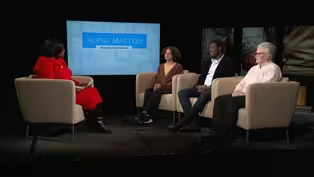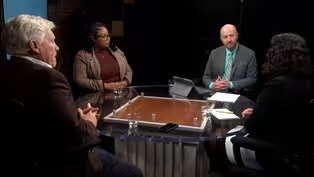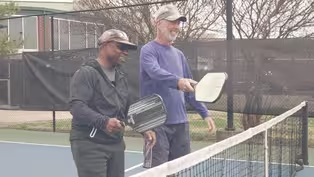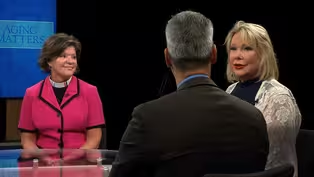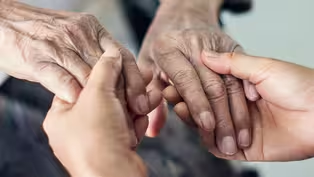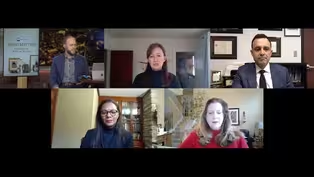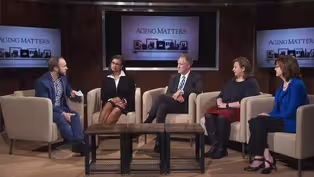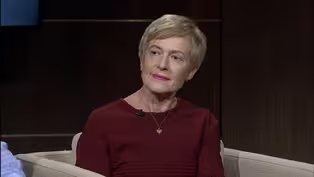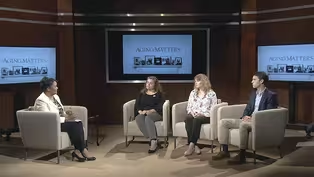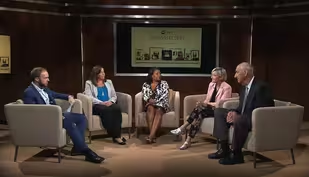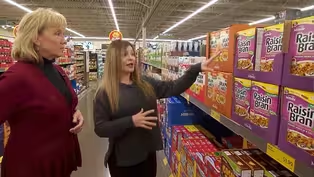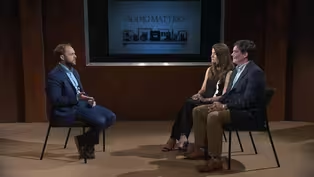
Women Unseen Panel Discussion
Special | 26m 46sVideo has Closed Captions
Experts discuss what has to change to give older women the quality of life they deserve.
Panelists Grace Sutherland Smith, executive director of AgeWell Middle Tennessee; Vickie Harris, founder and CEO of Community ConneXor; and DarKenya W. Waller, executive director of the Legal Aid Society of Middle Tennessee and the Cumberlands discuss resources for older women, and what needs to change to give them the quality of life they deserve.
Problems playing video? | Closed Captioning Feedback
Problems playing video? | Closed Captioning Feedback
Aging Matters is a local public television program presented by WNPT

Women Unseen Panel Discussion
Special | 26m 46sVideo has Closed Captions
Panelists Grace Sutherland Smith, executive director of AgeWell Middle Tennessee; Vickie Harris, founder and CEO of Community ConneXor; and DarKenya W. Waller, executive director of the Legal Aid Society of Middle Tennessee and the Cumberlands discuss resources for older women, and what needs to change to give them the quality of life they deserve.
Problems playing video? | Closed Captioning Feedback
How to Watch Aging Matters
Aging Matters is available to stream on pbs.org and the free PBS App, available on iPhone, Apple TV, Android TV, Android smartphones, Amazon Fire TV, Amazon Fire Tablet, Roku, Samsung Smart TV, and Vizio.
Providing Support for PBS.org
Learn Moreabout PBS online sponsorshipMore from This Collection
Learn more about the issues facing an aging population from a panel of experts and community members discussing various topics on aging for Nashville Public Television original series NPT Reports: Aging Matters.
Raised by Grandparents Panel Discussion
Video has Closed Captions
Individuals discuss both the challenges and the benefits of being raised by grandparents. (25m 8s)
Affordable Housing in Nashville
Video has Closed Captions
As the cost of housing surges in Nashville, we pause to consider a more affordable future. (26m 46s)
Video has Closed Captions
A discussion about making the most of our time and abilities as we age. (26m 46s)
LGBTQIA+ Resources in Middle Tennessee
Video has Closed Captions
A discussion of health and social services available for older Middle TN LGBTQIA+ adults. (26m 46s)
Long-Term Care: Know Your Options
Video has Closed Captions
A conversation exploring long-term care options in Tennessee and their affordability. (26m 46s)
Video has Closed Captions
Experts discuss how older adults can stay safer-at-home during the COVID-19 pandemic. (27m 9s)
Legal Help Panel Discussion | Aging Matters | NPT Reports
Video has Closed Captions
NPT’s Aging Matters: Legal Help sheds light on resources for legal assistance. (27m 24s)
Hospitals & Health Risks Panel Discussion | Aging Matters
Video has Closed Captions
A panel of experts discusses strategies for a safe hospital stay. (28m 39s)
Loneliness & Isolation Panel Discussion | Aging Matters
Video has Closed Captions
Brent Elrod, Gretchen Funk and Andrea Prince discuss issues of loneliness and isolation. (28m 32s)
Dental Health Panel Discussion | Aging Matters
Video has Closed Captions
Experts discuss SMILE ON 60+, an initiative aiming to improve oral health in older adults. (27m 16s)
Video has Closed Captions
Aging Matters: Practical Nutrition offers simple tips and advice. (28m 31s)
Aging & the Workplace Panel Discussion | Aging Matters | NPT
Video has Closed Captions
Aging & the Workplace Panel Discussion (32m 59s)
Providing Support for PBS.org
Learn Moreabout PBS online sponsorship- Aging, gender, and poverty are interrelated.
So as women age, they face some unique challenges.
Women typically live longer than men, and they are more likely to live alone in later life.
They are more likely to be caregivers.
And because they're more likely to be caregivers, they lose not only current wages, but may also end up with lower social security benefits from lost working years.
These multiplying effects of aging mean many women are unable to enjoy their later years, because they struggle to meet their basic needs.
What must change to give older women the quality of life they deserve?
And that's what we're here to discuss.
I'm Suzy Hence, Senior Producer at Nashville Public Television, and Producer of "Women Unseen."
Today I'm joined by Grace Sutherland Smith, Executive Director of AgeWell Middle Tennessee, Vickie Harris, Founder and CEO of Community ConneXor, and Darkenya W. Waller, Executive Director of the Legal Aid Society of Middle Tennessee and the Cumberlands.
Thank you all for being here today.
- [Vickie] Thank you.
- [Grace] Thank you.
- [Darkenya] Thanks for having us.
- [Narrator] Major funding for Aging Matters is provided by, The West End Home Foundation, enriching the lives of older adults through grant making, advocacy, and community collaboration.
The Jeanette Travis Foundation, dedicated to improving the health and wellbeing of the Middle Tennessee community.
The HCA Healthcare Foundation, on behalf of TriStar Health.
Cigna, together all the way.
Additional funding provided by, Jackson National Life Insurance Company, The Community Foundation of Middle Tennessee, and by members of NPT.
Thank you.
- When I was producing "Women Unseen" I asked everybody I interviewed the same first question, and I wanted to ask you all this question as well.
And that is, when you hear the phrase "women unseen" what does that mean to you?
- Professionally, I think "women unseen" is that we have probably journeyed from a place in corporate America in our work lives, where we've not always been valued.
Personally, I think that also applies.
And so, I bring this unseen, to the caregiving role, because I actually have referred to it as feeling like the tree falling in the forest and nobody hearing.
And nobody understanding the many impacts that that caregiving role is having on me as an individual, as a female, because I seem to be able to navigate and just do it.
- When I think about "women unseen" I think of two things.
One is women taken for granted, particularly when it comes to family caregiving.
I also think about women not being prioritized.
And particularly as we do more advocacy, both at the local and the state level, I think both those things are true.
- When I think of "women unseen" I think about the fact that women are the ones who actually have to often seek legislation to have rights, or to have rights taken away.
If you've never been in a position where legislation was required for you to have or not have rights, then you don't understand being unseen.
And that's what I think of when I hear that.
- We spoke about caregiving and you mentioned, Vickie, that it affected so many parts of your life, and I was wondering if you could talk a little bit about that.
- I've referred to family caregiving, family care partnering, whichever one you want to call it, as a whole family experience, but it actually is an experience for each individual that impacts every aspect of their lives.
And so for me, it became an experience that impacted me physically, mentally, okay.
You're exhausted, you're stressed.
You're having to be the cheerleader at the doctor's office, okay, in preparation for the bad news, while you're managing your emotions.
You are having to try to make work happen within the hours that you have, while also taking on these additional tasks that are time consuming.
There are only 24 hours in a day and I refer to that as my capacity.
And so I have come to look at time like I do money, and that I only have 24 hours to spend in a day.
And so where I spend it becomes very important, or otherwise it does create additional stress.
Financially, for me the last seven years has been a percentage of what I believe my income could have been as a result of this family caregiving role.
And so I have lost wages in the present period, so I've been able to maintain a quality of living that's acceptable to me.
Otherwise, I think that would have probably manifested anger and anxiety, more so.
But then I looked at it as lost wages, lost benefits in future periods, because I wasn't able to contribute to a retirement plan, 'cause I was just making enough money to get by on.
I was not contributing to social security to the degree that I would've been if I was working full-time.
So that then will impact me in future periods when I am outside of that family caregiving role.
- And I think that's something maybe we don't think about.
The social security that is lost when providing care for a loved one, and that future that is affected by that.
Grace, I wanted to ask you in your role, at AgeWell Tennessee, I wonder how maybe you've seen caregiving affect people?
- Sure.
As we receive more calls from family caregivers looking for assistance, I think most often they are overwhelmed.
They don't know where to start, they don't know what's available.
And so being able to provide a 30 minute consultation and really listen to what's going on in their situation, and help them figure out what their best options are, and their next steps, it's amazing how that short engagement produces so much gratitude because they know they're not alone.
They now have a plan, and they understand what their options are, and then what to do next.
So I think there's a lot to be said for helping caregivers realize they're not alone and then help them figure out how to get the help they need.
- And we were speaking earlier Darkenya, and you had an interesting story from the employer perspective about paid leave, and I was wondering if you could maybe share that with us.
- Yeah, yeah absolutely.
And what it was is just at our organization we were working through expanding parental leave, maternity leave, paternity leave, opportunities for people to be home and care for young children.
And one of my employees approached me and said have we given any thought to leave for those who are caring for parents?
And to be candid and and transparent about it, at the time I wasn't in a position where I was caring for a parent.
And while I understood it, I heard her, I did not have the lived experience at the time to understand how much of an impact it really is.
And now having seen it from the other side, it's nearly equal in some respects in terms of the level of attention that's necessary to care for aging parents.
And more often than not, that burden is carried by the women in the family.
And it really takes a toll on the employees at work.
And I think you referenced it earlier, the idea that you have a full-time job that you're working, and then trying to add to that these additional tasks.
And just the idea that if there is consideration for the time and effort it takes to care for a child, there should be similar consideration for those who are caring for parents.
- One of the other things we talked about in "Women Unseen" was poverty and economic security.
There's a statistic that 54% of females that live alone in their older years are not economically secure.
They do not have enough money to meet their basic needs.
Can we talk about what keeps somebody economically secure?
- When I think about economic security, it's a combination of having enough to live on comfortably, but also having enough of an emergency fund, that when something happens you can pay for those expenses.
It won't create a crisis.
And so, as the cost of groceries, and medicine, and gas, and housing keeps increasing, what we need and what older women need, that amount, is going up.
And if you're living on a fixed income and relying on social security as your primary source of income, that's not going up at the same pace of everything else.
And so it does make it very challenging.
- Poverty is determined by the government.
I mean there's a threshold by which they determine what poverty is and it falls under the federal poverty guidelines.
And so in current terms, a family of one, a single person living alone, the poverty level is around $14,000, $15,000.
It may be up to 16 by now, but nonetheless, somewhere between $14,000 and $16,000 is the annual income that is defined as the poverty level.
And a family of four is about $35,000 for four people.
Where that becomes an important distinction is when we start talking about public benefits and those things that people are eligible for.
SNAP benefits, what used to be called food stamps, public housing, even legal services in some respects, they're all based on some multiplier or the baseline of the federal poverty guidelines.
And when you consider that that's the threshold, many times those aging persons do have income, but they honestly fall within that threshold between poverty where they are eligible for services, and not being eligible for services because they make slightly above that, but still fall below what's necessary for to live comfortably.
And so they find themselves in a situation where they can afford neither.
- The social security benefit credit was brought up.
For those who are caregiving, what are some thoughts?
- From a family caregiver perspective, I honestly believe one of the requirements as far as a policy change is concerned, is the social security benefit that is paid that should be paid for family caregiving.
Okay, for a single female who enters the retirement years, and they've lost six years taking care of children, okay, then they lose another six taking care of parents, that's 12.
Now I believe social security counts should last 35, or something like that, to determine your retirement benefits when you choose to access those.
But if you're just losing, and so on the family caregiving side, with older adults taking care of parents, those are your high income, likely your high income years.
And so I do think that there should be some degree of compensation back to that individual, be it a female, or if it's a male, but you know, more likely to be a female.
Because if we look at what goes on relative to the family caregiver, and taking care of that older individual in the community, we are actually saving the government money, okay.
Either on the Medicare side or on the Medicaid side.
So they're not eligible for public benefits, okay, so somebody is doing the meals, somebody's doing the housekeeping, and no government program is paying for it.
Somebody is subsidizing the medication, and doing all of those tasks, that if they were below the poverty line, they would be getting assistance with.
And so I think that's one thing.
The other initiative that I think is very important is at this transformative period, post pandemic, okay, that we step back and we look at the Aging Service Network, and I honestly the pandemic, I call it CIA.
The pandemic forced us to be more collaborative, which is critically important, because if I am vulnerable and have one need such as food insecurity, I likely have other needs, so it may be utility assistance.
Or if I have been living on social security, I've not been able to put money back into my house to maintain it.
And so my utility assistance need could be driven by my house, okay.
And so usually people come with multiple needs.
And so the "I" in the CIA is innovation.
We've got to rethink and re-engineer how we deliver services.
It's not that we don't have services, it's not the what, it's how we're delivering them, because we've gotta get more efficient about it.
And the "A" is accountability, okay.
And so up until this point we've been okay with just saying we delivered a meal.
Well, if we delivered you a meal, a food box, and it was loaded with carbohydrates and you're a diabetic, I've not served you well.
Okay, now I get to check off on my grant report, or my report to the government that I delivered 50 meals, but maybe 35 of those actually triggered high blood sugars, and 20 of those folks ended up in the emergency department, and five of them ended up with a short hospital stay.
And this goes back to the value of a family caregiver, because that is tailored to that individual, that family caregiver.
So we're not having those episodes, avoidable episodes, to occur because it's tailored, it's one-on-one.
And so I think we've got, as a system, we've got to really rethink, re-engineer, and apply innovation.
So I always go to the CIA and say, you know, we've got to come to the table with that in mind.
And it's critically important that we think about that we've gotta meet people where they are, and they're in the community, okay.
And when I say community these days, I mean the micro community.
Because if you think about Davidson County, it is a county of neighborhoods.
And so if I'm in Bellevue, it looks different than it looks in Antioch.
And so it is at that micro level where the needs are, and we've gotta rethink, re-engineer how we do that.
- I think the social security credit is an excellent idea.
The other thing that some states are experimenting with is paying family caregivers and requesting Medicaid waivers to support that.
It's another way of saying, we see you as family members, you all are saving money by providing that care, and we are going to compensate you something for that, because in the end it is saving money.
- You brought up housing and I wanted to talk to you about this, Grace, intergenerational home sharing?
I wonder if you could talk a little bit about that, and do you think maybe that's another way we could help women as they age?
- This is something that AgeWell has been looking at for several years now, looking at what other cities are doing to solve the affordable housing crisis.
And what we've seen is more creativity around the recognition that most older adults are living at home and wanna stay at home.
So how do we make better use of existing housing stock?
Let older adults stay in their home, but also rent out a spare bedroom.
Have a housemate who may be a graduate student, or someone else in the community, who needs below market rental rate.
And what we've seen through the cities that have experimented with this is that it is a win-win.
It's a win for the older homeowner, because suddenly they have 600 or 700 more dollars a month that they can use for food and medicine and other things.
It's also a win for that renter, who not only is finding more affordable rent, but there's also that social connection, that sense of helping, because often the renter is helping the homeowner with chores in exchange for that reduced rental rate.
So it really is an idea we hope will take hold here again to make better use of existing housing as part of the affordable housing solution, and to provide that supplemental income for older homeowners.
- Darkenya, I want to go with you and talk about some policies, and I was wondering if you had any thoughts on policies we could support?
- Not necessarily any particular policy that I would drive towards, but what I would encourage highly is to just educate our lawmakers.
Because oftentimes when things don't happen, it's because they're unaware.
That's not to say that some aren't, you know, keenly aware, and you know, things don't change, but often it's just educating, going in and sharing personal experiences.
And from my experience, they want to hear that.
They want to know, you know, what's happening with their constituent base.
What is, you know, what's impacting you?
What are you seeing?
And what would be helpful for you?
Because that does then truly turn into the legislation that helps change situations.
And a lot of times people are looking for that big change, you know, that big legislation that comes through.
But oftentimes it's on the local level, it's on the, you know, school board level.
It's on your council level, your alderman level, that the changes are being made that could certainly impact you and what you need.
So just in a general sense of really going and expressing, you know, what's happening in your communities is probably the best thing anyone can do to change the situation.
- So we just have a few minutes left, and I just wanted to get one more statement from each of you about women, and maybe a way we could be seen instead of unseen.
- I do think that we owe it to those coming behind us to speak up on those things that are not just, okay.
If you don't speak up, they don't change, and that is critically important.
And while family caregiving has predominantly been a female role, I do know many men are stepping up to the plate.
My brother carried a significant load as well.
But because of history, it typically falls on the female.
And I think that if nothing else, we need to speak and make folks aware of the value that we represent.
We don't even have equity on pay yet, so, but we do need, because otherwise we're creating tomorrow's problem.
So we're talking about older women aging into poverty, or aging into a point that they can't afford to live comfortably.
That started decades before.
And so trying to solve it in the present, and not addressing the root cause of it is not a good strategy.
So I would very much encourage women to speak out and look at the longitudinal impact on our lives as well as our daughter's lives.
- It's so important that we tell our stories.
That we tell our family's story, that we encourage other women to tell their stories.
We met with some reporters recently who said we need stories, we want people to interview who can bring this issue to life.
And it was a conversation about family caregiving.
And so we need people to say, I'm willing to tell my story because I wanna make a difference.
And I think we need to do that in the workplace too.
We cannot just talk about childcare without also talking about elder care.
And the fact that many of us now are sandwiched between raising children and caring for aging parents.
And we need to tell our employers, and we need to demand that our employers respond to that if they wanna keep us in the workplace.
- In addition to that, I just think it's important to just have those crucial conversations.
Oftentimes to the point that you made, you know, women will just step up and we'll do it because, you know, for many of us it's just a natural thing to do.
But there should be crucial conversations with family members and actually, you know, getting to the nuts and bolts of compensation for the work that you're doing.
Obviously there's plenty to be done on a legislative level, you know, to really address this.
But in you know, everyday, you know, life it's important to have those conversations and to discuss compensation.
Okay, I'm going to leave my job to go take care of mom and the siblings agree that we'll each contribute $200 per month for that support that you're offering, or you, you know live in the home rent free, and we, you know add these things to it, you know, to compensate you.
But those have to be conversations that need to be had early on, and ideally with the person who potentially will need the assistance, securing certain documents in place, advanced healthcare directives, powers of attorney.
So that when capacity, you know, becomes an issue for your aging parent you're not then faced with the arduous task of potentially having to set a conservatorship to take care of this person, which is an additional expense that's added on to many caregivers who are, you know, needing to be able to talk to the doctor, to talk to, you know, the mortgage company, or whomever else is involved.
So just thinking through what it is that you're engaging in, and finding opportunities to have those conversations with your family as soon as you can, so that you're not kind of saddled with this labor of love, but it costs.
- Well, I just wanna thank all of you for being here today and sharing your expertise and insight, and I know I've learned a lot.
And I also wanna thank you all for joining us and if you would like to learn more about this please visit our website at wnpt.org/agingmatters.
(soft music) - [Narrator] Major funding for Aging Matters is provided by, The West End Home Foundation, enriching the lives of older adults through grant making, advocacy, and community collaboration.
The Jeanette Travis Foundation, dedicated to improving the health and wellbeing of the Middle Tennessee community.
The HCA Healthcare Foundation, on behalf of TriStar Health.
Cigna, together all the way.
Additional funding provided by, Jackson National Life Insurance Company, The Community Foundation of Middle Tennessee, and by members of NPT.
Thank you.

- News and Public Affairs

Top journalists deliver compelling original analysis of the hour's headlines.

- News and Public Affairs

FRONTLINE is investigative journalism that questions, explains and changes our world.












Support for PBS provided by:
Aging Matters is a local public television program presented by WNPT
